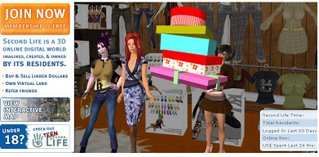 'Communities in Cyberspace' alluded to the notion that online communities and the emerging means by which to engage them are offering sensory experiences so advanced that it is difficult to distinguish user behavior here apart from that of the 'real world'. Second Life is one such MUD - growing considerably in popularity and hosted features.
'Communities in Cyberspace' alluded to the notion that online communities and the emerging means by which to engage them are offering sensory experiences so advanced that it is difficult to distinguish user behavior here apart from that of the 'real world'. Second Life is one such MUD - growing considerably in popularity and hosted features.http://www.youtube.com/watch?v=synxFmQJ_0A"
http://www.npr.org/templates/story/story.php?storyId=6431819
The above links provide video and audio insights to the advantages and appeal of Second Life. It is a 3D virtual reality platform founded by Linden Labs and former RealNetworks CTO Philip Rosedale. Hearkening greatly to Keller & Smith's discussion concerning extended 'identity' (those who opt for digital interpretations of their 'real' selves or go for more egotistic interpretations), Second Life users can choose their appearance and are given tools to alter and interact with the virtual world around them. A network community, it operates and evolves independently of any one user. Fluid (or dynamic) access as such is representative of the progressively dominant real time forums that are emerging - echoing real life as synchronous worlds of their own.
In the discussion of gender and racial issues, I thought the complexity of those issues, in terms of digital extensions, owe much to the choices that users are presented with. Users in Second Life can follow more real world confines in the creation of their digital self : choosing between man and woman, African American and Asian, etc. Or they can create fantastic creatures and characters entirely unavailble in reality. This forum hosts both dominant emergent viewpoints as to how cyberspace should be engaged.
Keller & Smith noted the impact of cyberspace onto the 'real world' when discussing political activism. Second Life offers perhaps an even more tangible avenue for this, as users accumulate 'points' which are convertible to actual cash. In effect, you can run a virtual business (selling property, virtual goods, rights, etc.) and reap real monetary profits. One can even create a virtual mockup of a real world conference room and run an actual PowerPoint presentation that you've created to show to your coworkers.
It also offers a prime example of the ultimate 'culture layer' : a digital replica interface of actual buildings, people, parks, streets, etc, as well as a truly interactive and randomly accessible new media portal, suggested in Principles of New Media as two of the definers of the title's name topic. In Principles, VR auteur Jaron Lanier suggested virtual reality will void the need for language-based and symbol-based communication.
